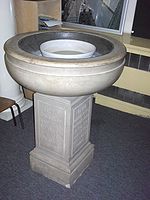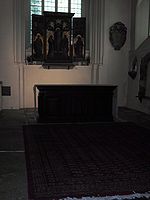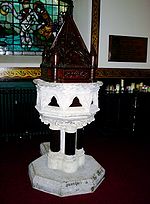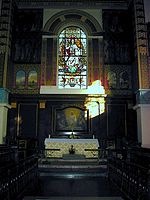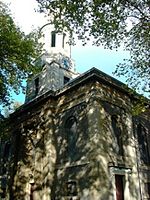Talk:City of London and Middlesex Towns and Villages S
Contents
St Clement Danes
There has been a church of St Clement Danes on this site for over 1000 years, the building was rebuilt by Sir Christopher Wren, but bomb damage in World War II left only the tower and walls standing. After restoration by the RAF completed in 1958 it is now the Central Church of the RAF. The crypt has been cleared of burials, the remains were cremated and placed elsewhere in the church, but the coffin plates have been preserved and line the crypt walls. It is open daily and if you are there on the hour you will hear the bells play "Oranges and Lemons".
St Giles in the Fields
The West Street chapel was built in 1700 and leased by the Methodists from 1743-1798, Charles Wesley preached there frequently.
St James's Palace
There are two Chapels Royal in the Palace, the Chapel Royal itself and The Queen's Chapel, both of which are open to the public on Sundays for worship, from the first Sunday in October to Good Friday inclusive at the Chapel Royal, and at The Queen's Chapel from Easter Sunday to the last Sunday in July inclusive.
St Michael le Strand
- St Michael le Strand, Burleigh Street – demolished 1907, Strand Palace Hotel now on the site.
St Martin in the Fields
The plaque outside reads as follows: “This Church was founded in 1693 by Huguenot refugees who fled from France at the time of the Revocation of the Edict of Nantes. In 1776 the chapel passed into the hands of the Church of England. The Rev. Augustus III Toplady author of “Rock of Ages” was one of its ministers. The Chapel passed into the hands of the Congregationalists in 1787. Adjoining the chapel was Sir Isaac Newton’s house which was built in 1710 and condemned in 1913. Mrs Jemima Luke, author of the beloved hymn “I think when I read that sweet story of old” was a teacher in the Sunday School. A copy of the hymn in her own handwriting is in possession of the church.”
This church, at the side of Trafalgar Square is open every day. From 1802 the burial ground was in Camden on 4 acres of farmland bought by an Act of Parliament. The same Act provided for the area to be enclosed by a wall and for a chapel to be erected, while a further Act allowed Almshouses to be built on the site. When unused portions of the graveyard were sold off, bodies were exhumed to a public outcry. Today the burial ground is a public park called St Martin's Gardens, many gravestones remain on the perimeter, some of which are still legible.
- St Michael le Strand, Burleigh Street – demolished 1907, Strand Palace Hotel now on the site.
St Pancras
- The Old Church as seen today is largely a Victorian restoration dating from 1847 although there has been a church on the site for many centuries before the first listed priest in the twelfth century. In 1822 an enormous new Parish Church was built at Euston Road. A large green space surrounds the old church and a few notable gravestones and memorials remain from what was once a much larger site. The church appears to be open daily.
- St Andrew, Haverstock Hill - demolished.
- St Bartholomew, Grays Inn Road - demolished.
- St John the Evangelist, Charlotte St Fitzroy Square - demolished.
- St Jude, Grays Inn Road - demolished.
- St Matthew, Oakley Square - demolished 1980s.
- St Saviour, Maple St - demolished.
- St Thomas, Agar Town - demolished.
- All Saints, Gordon Sq, demolished.
- Christ Church, Chalton St Somers Town, bombed WW2.
- St James, Hampstead Rd, demolished.
- St Peter, Regent Sq, blitzed.
Shoreditch
- Former St Augustine is now redundant, since its deconsecration it has been the clubhouse for the 59 Bikers Club started by a vicar with an enthusiasm for motorbikes and now has been converted into flats and a resteraunt.
- St John the Apostle, Shoreditch Is not normally unlocked except when in use. The surrounding graveyard has a few memorials remaining.
- St James Church, Curtain Road, Shoreditch - demolished in 1935.
- St Mary, Haggerston - bombed WW2.
Soho, St Anne
- St Mary, Crown Street - demolished.
Spitalfields
- Brick Lane Mosque (Jamme Masjid) was built in 1743 for the Huguenot population as a French Protestant Church, in 1819 it became a Methodist Chapel. From 1898-1976 it was the Spitalfields Great Synagogue and has been the Brick Lane Jamme Masjid since 1976.
- St Mary Church Passage, Spital Square - now gone.
- St Stephen Commercial Street - now gone.
- White's Row Chapel - now gone.
Stepney
- St Thomas - destroyed by bombing WW2.
